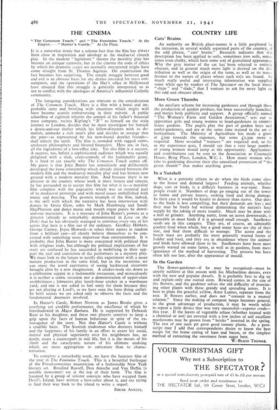THE CINEMA
" The Common Touch " and " The Feminine Touch." At the Empire.—" Hatter's Castle." At the Plaza.
IT is a somewhat ironic but a solemn fact that the film has always been close in inspiration and ideology to the mediaeval church play. In the modern " legitimate " theatre the morality play has become an antique curiosity, but in the cinema the code of ethics by which the dramatic issues are normally interpreted might have come straight from St. Thomas Aquinas. On examination the fact becomes less surprising. The simple struggle between good and evil is an obvious basis for any drama intended for mass con- sumption, and the operations of the Hay's office in Hollywood have ensured that this struggle is generally interpreted so as not to conflict with the ideologies of America's influential Catholic community.
The foregoing considerations are relevant to the consideration of The Common Touch. Here is a film with a banal and im- probable story and bristling with situations which might well have become acutely embarrassing in their naiveté. A public schoolboy of eighteen inherits the control of his father's financial trust company, recites Kipling's " If " to himself on the train journey to London, decides that he must investigate for himself a down-and-out shelter which his fellow-directors wish to de- molish, unmasks a rich man's plot and decides to arrange that the poor—as represented by his new-found derelict friends— shall inherit the earth. The film is crowded with ragged saints, unshaven philosophers and bloated financiers. Here are, in fact, all the ingredients of a box-office joke. Yet this film is a success. A success, too, before" a sophisticated audience which was equally delighted with a slick, crazy-comedy of the fashionable genre. It is hard to say exactly why The Common Touch comes off. My guess is that John Baxter has consciously and deliberately developed the loose relationship which already existed between the modern film and the mediaeval morality play and has broken new ground with a modern morality film. And because there is no director in the country whose work is more honest and sincere, he has persuaded us to accept this film for what it is—a morality film complete with the pageantry which was an essential part of its mediaeval prototype and with moral issues embellished with music and dancing. The greatest triumph of the film, indeed, is the skill with which the narrative has been interwoven with dances by Greta Gynt, solos by Mark Hambourg and Sandy MacPherson and dance music and mouth organ pieces by down- and-out musicians. It is a measure of John Baxter's powers as a director (already so remarkably demonstrated in Love on the Dole) that he has obviously managed to convince every one of his actors that here is a film out of the ordinary. Geoffrey Hibbert, George Carney, Joyce Howard—tc select three names at random from a brilliant cast—all clearly believe themselves to be con- cerned with something more important than entertainment. It is probable that John. Baxter is more concerned with political than with religious ends, but although the political implications of his story are confused he has succeeded in mobilising in their sup- port the zeal and conviction of the performers in a mystery play. We must look to the future to justify this experiment with a more mature production in the same kind, but in the meantime we can enjoy the novel experience of seeing hackneyed situations brought alive by a new imagination. A cricket-team sits down to a celebration supper in a fashionable restaurant, and miraculously it is neither a comic occasion nor a demonstration of upper-class snobbishness ; labourers play lunch-hour cricket in a warehouse yard, and one is not asked to feel sorry for them because they are not playing at Lord's, as we have seen the hero doing earlier. In both scenes we are asked only to observe the facts and the fundamental decencies involved.
In Hatter's Castle, Robert Newton as James Brodie gives a terrifying yet credible performance, the excellence of which he foreshadowed in Major Barbara. He is supported by Deborah Kerr as his daughter, and these two players contrive to keep a grip upon the facts of human behaviour in spite of the ex- travagance of the story. Not that Hatter's Castle is without a credible basis. The Scottish tradesman who destroys himself and the happiness of his family in an effort to assert his social, mental and physical superiority over his neighbours has, no doubt, many a counterpart in real life, but it is the means of his climb and the cataclysmic. nature of his ultimate undoing which are more appropriate to caricature than to charac- terisation.
To complete a remarkable week, we have the funniest film of the year in The Feminine Touch. This is a beautiful burlesque of the Freud-conscious neuroticism of a fashionable New York literary set. Rosalind Russell, Don Arneche and Van Heflin (a notable newcomer) are at the top of their form. The film is haunted by a group of sinister convicts who have escaped from Devil's Island, have written a best-seller about it, and are trying to find their way back to the island to write a sequel.
EDGAR ANSTEY.


























 Previous page
Previous page